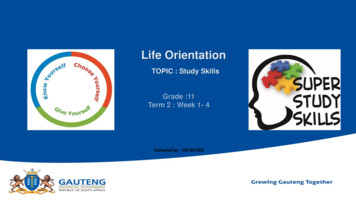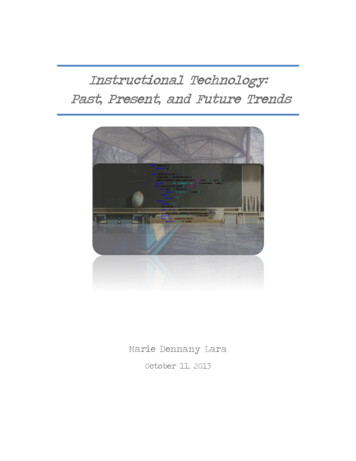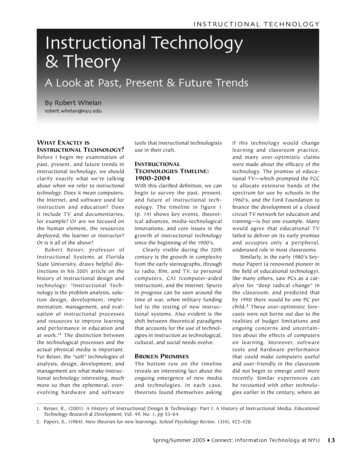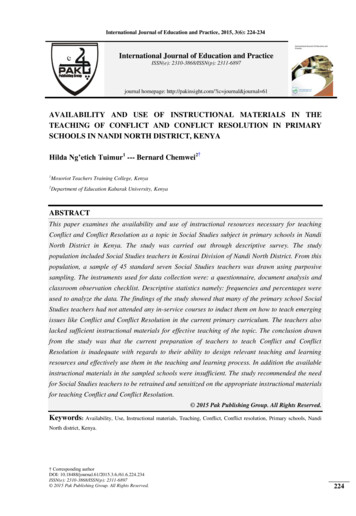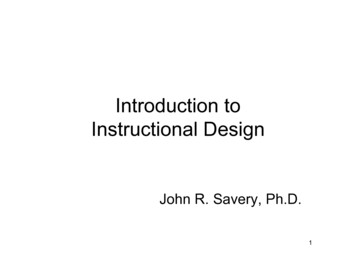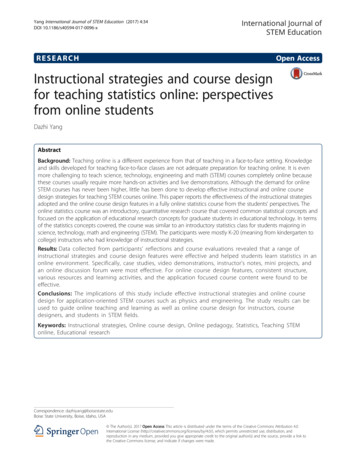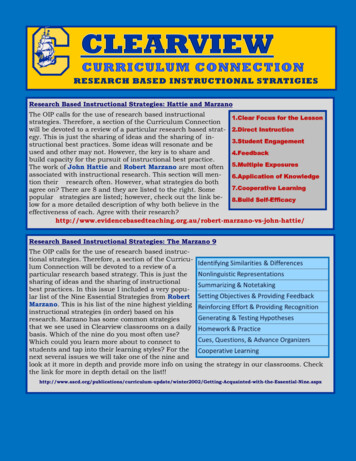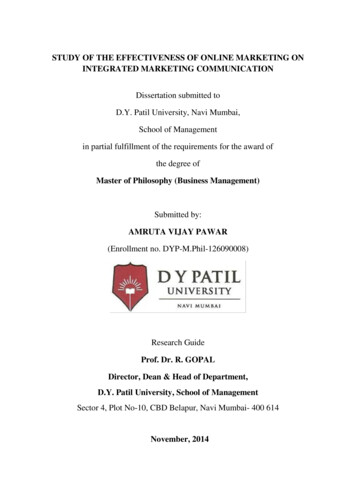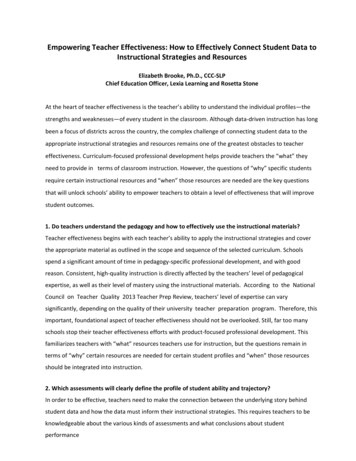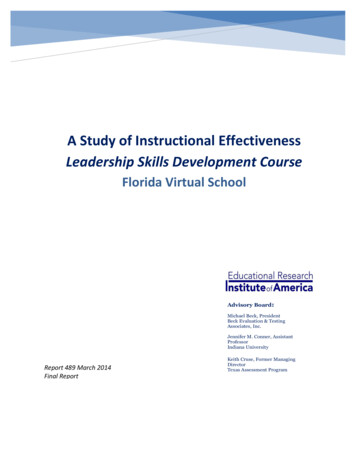
Transcription
A Study of Instructional EffectivenessLeadership Skills Development CourseFlorida Virtual SchoolAdvisory Board:Michael Beck, PresidentBeck Evaluation & TestingAssociates, Inc.Jennifer M. Conner, AssistantProfessorIndiana UniversityReport 489 March 2014Final ReportKeith Cruse, Former ManagingDirectorTexas Assessment Program
Effectiveness of Leadership Skills DevelopmentContentsExecutive Summary. 3Overview of the Study . 4Research Questions . 4Course Description . 4Research Base for the Leadership Skills Development Course . 6Overview of the Leadership Skills Development Course Non-Cognitive Factors. 6Key Non-cognitive Factors . 9Growth Mindset. 10Locus of Control and Agency . 10Goal Setting. 11Grit . 11Social Intelligence . 12Delayed Gratification and Self-Control . 13Connecting the Non-cognitive Research Findings to the Leadership Skills DevelopmentCourse. . 14Instructional Approach . 14Instructional Content. 14Growth Mindset. 14Locus of Control and Agency . 14Goal-Setting . 15Grit . 15Social Intelligence . 15Delayed Gratification. 15Analyzing Student Assessment Performance . 16Description of the Assessment . 161 Page
Effectiveness of Leadership Skills DevelopmentStandard Setting Process . 17Standard Setting Results . 18Recommendation for Standard Setting . 19Demographic Characteristics of the Student Population . 20Applying the Standards to Students Performance . 21Students Rate Learning in the Leadership Skills Development Course . 22Summarizing the Quantitative Results . 22Summarizing the Qualitative Responses . 26Question 1: Briefly explain what you learned about leadership in this course and what it takesto be a leader. . 26Question 2: What one leadership skill have you found most helpful? Please explain. . 31Conclusions . 33Question 1: Does existing research support the design and content of the Leadership SkillsDevelopment course? . 33Question 2: Do students achieve adequate levels of success on assessments designed asoutcome measures of student knowledge and achievement? . 33Question 3: Do students have positive views of what is included in the course, how well thecourse concepts have been taught, and do they recognize how the skills and strategies canhelp them now and in the future? . 34Bibliography . 362 Page
Effectiveness of Leadership Skills DevelopmentExecutive SummaryFlorida Virtual School (FLVS ) contracted with the Educational Research Institute of America(ERIA) to conduct an efficacy study of an FLVS course entitled, Leadership Skills Development.The course was developed jointly by FLVS and Mawi Learning.Florida Virtual School is an established leader in developing and providing virtual Kindergartenthrough grade 12 education solutions to students worldwide. As a student works through themodules of a course, he or she will connect with the teacher to take exams online and receivediscussion-based assessments over the phone. Students do the work at their own pace and ontheir own time, but they interact with their teachers in multiple ways--including Live Lessons,phone calls, chat, texting, and email--throughout the course.The Leadership Skills Development course was developed to meet a set of skills and strategiesdesigned specifically for the course as well as Common Core Standards in understanding text.The purpose of this course is to teach leadership skills, goal setting, problem solving, decisionmaking, communication skills, group dynamics, time and stress management, public speaking,human relations, public relations, team building, and other group processes.There were three specific activities that formed the total evaluation of this course. The first wasa review of the research literature regarding the key topics or concepts upon which the courseis based. After the research review was completed it was evident that the conclusions of theresearch are reflected in the Leadership Skills Development course.A second activity included the standard setting for one of the two major assessments used inthe course. The standard setting process was conducted by an independent moderator andemployed the Bookmarking method of arranging test items from easiest to most difficult toassist committee members in determining cut scores. Using the established cut scores, thestudent performance data was analyzed. The results indicated very high student performancewith the majority of students scoring at an advanced level.A third activity was an anonymous student survey which sought students’ reactions to thecourse, whether they would be applying the skills and strategies they had learned, and whetherspecific strategies had been adequately taught. Approximately 400 students completed asurvey that included both close-ended questions and open-ended questions. Studentresponses indicated very strong support for recommending the course, for how it had beentaught, and an intention to use the strategies they had been taught. Most importantly,students recognized how the skills and strategies can help them now and in the future.3 Page
Effectiveness of Leadership Skills DevelopmentOverview of the StudyCarefully constructed studies are needed to determine the efficacy of online courses as thesecourses continue to expand and provide an important education opportunity to all students.The enrichment of a student’s educational opportunities through online courses can help toprepare the student for the demands of post-secondary education and the workplace. Inaddition, FLVS provides an invaluable service to those students who cannot otherwise attend abrick-and-mortar school. FLVS has developed a unique approach to online course instructionthat combines excellent online resources accompanied by significant support and guidancefrom teachers.Carefully planned and thoughtfully implemented efficacy studies are very important if they areto assist in improving education. Descriptive analyses of data, student surveys, researchreviews, and student performance analyses are all important aspects of a comprehensiveefficacy study. These various procedures must be planned with a thorough understanding ofthe program’s goals and structure.Research QuestionsThree research questions were developed from discussions with staff from the Florida VirtualSchool (FLVS), Mawi Learning, and the Educational Research Institute of America (ERIA).The three research questions focus on the design of the study and the data analyses:1. Does existing research support the design and content of the Leadership Course?2. Do students achieve adequate levels of success on assessments designed as outcomemeasures of student knowledge and achievement?3. Do students have positive views of what is taught in the course, how well the courseconcepts have been taught, and how the skills and strategies can help them now and inthe future?Course DescriptionThe Leadership Skills Development course is described by FLVS as follows:The purpose of this course is to teach leadership skills, goal setting, problem solving, decisionmaking, communication skills, group dynamics, time and stress management, public speaking,human relations, public relations, team building, and other group processes.4 Page
Effectiveness of Leadership Skills DevelopmentThe content includes, but is not limited to, the following: study in self-understanding development in such areas as goal setting, self-actualization, and assertiveness study of organizational theories and managementIn this course, students will acquire new power to succeed in high school, college, and life.Students will learn how to take action by pressing their Turbo Button, manage their time bystaying in the Lasting Zone, chart their goals by creating a North Star, and using many otherproven leadership techniques developed by Mawi Learning, a leadership training organizationthat has worked with more than 1 million students. Whether students are struggling or alreadyat the top of their game, Leadership Skills Development will give them new power to create thelife of their dreams.5 Page
Effectiveness of Leadership Skills DevelopmentResearch Base for the Leadership Skills Development CourseStaff from Mawi Learning and ERIA, with the guidance and review of FLVS staff, developed anoutline of the key topics and skills on which the course was based. This list focused almostentirely on non-cognitive factors explained more fully below. A research review was conductedto find the most significant published research on each topic. Finally, the results of thesestudies were compared to the Leadership Skills Development course, and it was found that thecourse content and structure embody the research base.Overview of the Leadership Skills Development Course Non-Cognitive FactorsSince the No Child Left Behind Act of 2001 and other accountability mandates at federal, state,and local levels, educators—researchers, policy makers, school administrators, and teachers—have been focused largely on students’ content knowledge and performance as outlined bystandards and measured by test scores. During that same period, there has been anaccumulation of evidence related to U.S. students’ lack of social and behavioral skills necessaryfor success in school, along with continually increasing concerns about violence and bullying inschools (Jones & Bouffard, 2012). Now, a new movement is underway to better understand andcultivate non-cognitive factors that impact academics and the practices and programs schoolsshould engage in to best prepare students for success in the 21 st century.Non-cognitive factors are a person’s emotional, psychological, and social attributes; attitudes;habits; and skills. The factors are distinct from a person’s intellect but significantly influence it—and combined, cognitive and non-cognitive abilities, are a predictor of a person’s future successand stability (Heckman, 2008). “While the nature of the relationships and various pathwaysbetween academic behaviors and other non-cognitive factors is not yet entirely clear, theconnection between academic behaviors and academic performance is strong.” (Farrington etal, p. 16)“Non-cognitive factors” is just one term for—or one way of viewing—this set of competencies.Some see these factors more as traits than skills, or as part of “character development” or“values education.” Long ago, non-cognitive factors might have been called “virtues.” Noncognitive factors might be taught as part of “social/emotional learning,” as part of interventionprograms, or embedded within a curriculum with the aim to help students manage theiremotions, attain greater self-awareness or self-control, reduce stress, resolve conflicts,establish and maintain positive relationships, or set and attain goals. Non-cognitive factors mayalso be a focus of professional development for staff.6 Page
Effectiveness of Leadership Skills DevelopmentNomenclature aside, these intrapersonal and interpersonal traits are the subject of the currentwork of a number of prominent individuals and organizations collaborating on research andinitiatives funded by public agencies and private foundations. Interdisciplinary in its draw acrossfields—from economics to neuroscience to psychology to health, as well as, of course,education—the movement has garnered attention in TED talks, academic journals, professionalconferences, and best-selling books, including Paul Tough’s How Children Succeed: Grit,Curiosity, and the Hidden Power of Character, which, following its publication in 2012, spent 12weeks on The New York Times best seller list. And now this movement is driving policy anddirections for further research.Nobel Prize winning economist James Heckman spawned the burgeoning research into noncognitive factors that impact education. His research in the 1990s of the GED program led himto questions regarding the personality traits that contribute to success and then, in the early2000s, collaborations with social scientists that examined the effects of early childhoodinterventions. Heckman found that non-cognitive skills had a lasting impact on the children’slives. Several prominent psychologists, including Carol Dweck and Angela Duckworth, have alsocontributed greatly, via their research, writings, and speeches, to the increased attention andunderstanding of non-cognitive traits.Up until a decade ago, most teaching and assessment of non-cognitive skills ended inpreschool; 49 states have standards for the social-emotional development of its youngestcitizens. However, informed and inspired by new research findings, education policymakers atstate and national levels have more recently adopted and expanded Kindergarten-12 socialemotional learning standards and programs to better support students and prevent academicand behavioral problems. Currently three states—Illinois, Kansas, and Pennsylvania—haveKindergarten-12 standards for social-emotional learning. Additionally, social-emotional learningis integrated into the Common Core State Standards, which have been adopted by 45 statesand the District of Columbia. (Dusenbury et al., 2014; Jones & Bouffard, 2012)Recent reports of research findings and recommendations by high-profile committees have alsofocused on the significance of these non-cognitive factors in positive educational, career, andhealth outcomes and how the educational community can best foster students’ development ofthe factors. Such reports have included “Education for Life and Work: Developing TransferableKnowledge and Skills in the 21st Century” from the Committee on Defining Deeper Learningand 21st-Century Skills, and published by the National Research Council in 2012 as well as theU.S. Department of Education Office of Education Technology’s “Promoting Grit, Tenacity, andPerseverance: Critical Factors for Success in the 21st Century” in 2013.Non-cognitive skills have also entered the realm of large-scale testing. In August 2013, the U.S.Department of Education approved an Elementary and Secondary Education Act (ESEA) waiver7 Page
Effectiveness of Leadership Skills Developmentapplication from the California Office to Reform Education (CORE), authorizing eightparticipating school districts to design and implement a new accountability and continuousimprovement system called the School Quality Improvement Index, which will be used with amillion students to assess school performance as a function of academic outcomes (60percent), school climate and culture measures (20 percent), and social-emotional measures (20percent). The social-emotional domain of the assessment will comprise administrative data,such as attendance and suspensions, and measures of students’ social-emotional skills(Fensterwald, 2014; McNeil, 2013). This shift in testing policy reflects the views of the Directorof the Department of Education Institute of Educational Sciences, John Easton: "The test scoreaccountability movement has pushed aside many of these so-called 'non-cognitive' or 'soft'skills, and they belong back on the front burner." (U.S. Department of Education Office ofInformation Technology, 2013, p. 1)At the federal level, as of this time, The Academic, Social, and Emotional Learning Act of 2013(H.R. 1875) has been introduced as bipartisan legislation to expand the availability of evidencebased programs that teach students social and emotional skills such as self-control, goalsetting, collaboration, conflict resolution, and problem-solving. Bill co-sponsors cite the morethan two decades of scientific research demonstrating how these skills improve academicachievement and promote positive school climate. “Social and emotional competencies aren’t‘soft skills,’” explained Rep. Tim Ryan (D-Ohio), who introduced the bill currently co-sponsoredby Representatives Dave Loebsack (D-Iowa), Tom Petri (R-Wis.), and Matt Cartwright (D-Pa.).“They are essential skills. They are the foundation for all the other skills young people need tobe successful in school and in life.”(Collaborative for Academic, Social, and Emotional Learning,2014)In accounting for the integral role of non-cognitive factors, it is critical to acknowledge themalleability of these traits. From the Duckworth Lab’s research statement: “words like‘character’ or ‘personality trait’—may connote to some immutability. However, it is now wellestablished that traits change across the life course children and adults change their habitualpatterns of interacting with the world as they accumulate additional life experience.”As established by the decades of work conducted by Dr. Duckworth and other researchers—work that is driving the policies cited above—social-emotional-psychological traits can betaught effectively and can be cultivated and nurtured within students of all backgrounds.Indeed, in a meta-analysis of the outcomes of 213 social and emotional learning (SEL)interventions, Durlak and colleagues (2011) found the following positive effects in students whoparticipated in such SEL programs versus peers who did not: increased pro-social behaviors and decreased conduct problems;8 Page
Effectiveness of Leadership Skills Development improved academic performance (averaging scores of 11 percentile points higher onstandardized tests); improved attitudes about the self and satisfaction within school community; and decreased emotional distress.Further, citing other researchers as well, Durlak et al. concluded: “through systematicinstruction, SEL skills may be taught, modeled, practiced, and applied to diverse situations sothat students use them as part of their daily repertoire of behaviors.” (p. 406)In their review of the research literature on social-psychological interventions, Yeager andWalton (2011) found long-term positive effects that change students’ academic trajectories—and that the most effective and impactful programs: actively engage students’ direct participation; personalize students’ responses to program content so that the experience is directlyrelevant and meaningful; affirm values and employ a positive persuasive appeal rather than a corrective approachthat may instead stigmatize and yield negative outcomes; and target multiple social and psychological barriers to learning, as combining interventionscan have an additive effect.Key Non-cognitive FactorsThe non-cognitive umbrella encompasses a wide range of social, emotional, psychological, andacademic competencies and skills. As many researchers in this area have noted, it can bechallenging to separate one or another individual traits as there is a great deal ofinterconnectedness and influence among them, and the impact such traits have on oneanother, both positive and negative, is recursive (Farrington et al, 2012)—or what Yeager &Walton (2011) describe as a complex field of forces, a “tension system,” in which behaviors andattitudes interact, promoting some and restraining others. There are a variety of different waysthat non-cognitive skills are classified. Some researchers make a distinction between“interpersonal” skills—those needed for positive relationships, such as compliance,cooperation, communication, self-regulation, and “work” skills—those needed for positivelearning outcomes, such as planning, organizing, and completing tasks (Jones & Bouffard,2012).However, six non-cognitive traits have received particular attention from researchers andpolicymakers—and are key components within the Mawi Learning/Florida Virtual School9 Page
Effectiveness of Leadership Skills DevelopmentLeadership Skills Development course. These include growth mindset, locus of control, goalsetting, grit, social intelligence, and delayed gratification – and each is profiled below.Growth MindsetGrowth mindset, a concept pioneered by renowned psychologist Carol Dweck, is a belief that aperson’s intelligence, competence, and talents can be developed through dedicated efforts andhard work. In contrast to a “fixed mindset” in which people see their abilities as immutable, theidea is also linked to attitudes and perceptions regarding success and failure—and the amountof control one thinks he or she has in experiences with either throughout life.Mindsets—or core assumptions regarding them—have an enormous impact on students’academic behaviors and achievement and indeed their overall social-psychological well-being(Dweck, 2006; U.S. Department of Education Office of Educational Technology, 2013).According to Farrington et al, (p. 10): “Notably, across the empirical literature, one’s beliefsabout intelligence and attributions for academic success or failure are more strongly associatedwith school performance than is one’s actual measured ability (i.e., test scores).” Mindsetsdrive how much time and energy and intensity students devote toward their education—andthe outcomes of those efforts of course then have a recursive effect, perpetuating a positive ornegative cycle as results affirm beliefs (Dweck & Leggett, 1988; Farrington et al, 2012; Snipes etal, 2012). Students with a growth mindset are much more likely to persist in their efforts andovercome challenges (Dweck, Walton, & Cohen, 2011).There is a growing body of evidence spanning decades and fields of research that suggests thatmindsets are malleable; that intervention programs can be effective at altering students’perceptions of their own success and failure and fostering growth mindsets; and that whenstudents are taught to have a growth mindset, they are more successful academically (Blackwellet al, 2007; Farrington et al, 2012; U.S. Department of Education Office of EducationalTechnology, 2013; Tough, 2012; Yeager & Dweck, 2012).Locus of Control and AgencyLocus of control relates to how people perceive the power they have over events affectingthem (specifically, whether their control is internal, the result of an individual’s behaviors andactions, or external, largely due to other forces). The concept was developed by psychologistJulian B. Rotter in the 1950s and expanded in ensuing decades. Rotter saw that a person’s locusof control is not an innate personality trait exclusively but instead interdependent uponexperiences and environment—factors that also in turn reinforce the locus of control; pastrewards and punishments, however perceived, shape future attitudes, expectations, andbehaviors. Related to this concept is agency, or action taking. Albert Bandura, Rotter’scontemporary and another widely influential psychologist of the latter 20 th century, posited10 P a g e
Effectiveness of Leadership Skills Developmentthat a driver of one’s actions is self-efficacy—a person’s perceived abilities to learn, organize,and execute plans, and fulfill goals—and thereby exercise control over one’s circumstances.Bandura saw in people’s self-efficacy and sense of agency a similarly complex cycle of social andpsychological influences working upon each other in either positive or negative ways. Bandura(2001) stresses how important agency has become in an increasingly socially, culturally, andtechnologically complex world.Indeed, a sense of agency is part of the network of other non-cognitive skills impacting onstudents’ academic success (Farrington et al 2012), and by building agency, students enteringsecondary level education in particular utilize effective strategies and cultivate positiveattitudes that help them navigate common barriers to success in and outside the classroom(Raikes Foundation, 2012). Students who use problem solving skills to overcome obstacles andmake responsible decisions about school and work do better academically (Zins & Elias, 2006 inDurlak et al, 2011). Conversely, students who lack self-efficacy will often suffer decreasedmotivation and academic self-regulation, as well as devalue academic tasks (Cleary &Zimmerman, 2004).Goal SettingFor the past few decades, goal theory has been the focus of a number of influential researchersin the field of educational psychology, including Dweck, Pintrich, Schunk, Winne, andZimmerman. While the topic is broad and complex, there is consensus that goal orientationdrives outcomes. Especially when part of a process of self-regulated learning that both entailsand encourages strategic thinking and metacognition, goal setting and monitoring have beenlinked to high levels of motivation and achievement (Farrington et al, 2012; Cleary &Zimmerman, 2004).Embedding goal setting and ongoing monitoring of progress in meeting those goals as essentialcomponents in the learning process is an approach that educators can use to help studentsbecome more goal oriented, and better able to fulfill goals (Winne & Hadwin, 1998 in U.S.Department of Education Office of Educational Technology, 2013). Zimmerman (2002)advocates for—and sees great promise in modeling: “Each self-regulatory process or belief,such as goal setting, strategy use, and self-evaluation, can be learned from instruction andmodeling by parents, teachers, coaches, and peers.” (p. 69)GritPsychologist Angela Duckworth, who in recent years has put “grit” on the public radar, definesit in her TED talk on the topic as “passion and perseverance for very long-term goals stickingwith your future and working really hard to make that future a reality.” Grit has been cited byresearchers such as Dr. Duckworth and colleagues, policy makers, philanthropic foundations,11 P a g e
Effectiveness of Leadership Skills Developmenteducators, economists, and others concerned with the state of education and future prospectsfor the nation’s young people, as essential to success in school and beyond (Farrington et al,2012). As mentioned earlier, in 2013 the U.S. Department of Education Office of EducationalTechnology issued a report titled “Promoting Grit, Tenacity, and Perseverance: Critical Factorsfor Success in the 21st Century” as part of an initiative to shift focus to the broader skills andattitudes on which achievement depends.Duckworth and colleagues (2007, 2009) developed the Grit Scale, a brief self-reportingevaluation that the researchers found to be reliably predictive of success in endeavors as farranging as the National Spelling Bee, high-level college GPAs at Penn, and intensive summertraining at West Point—more reliably predictive, in fact, than a protracted military evaluationand IQ (Duck
Effectiveness of Leadership Skills Development 3 P a g e Executive Summary Florida Virtual School (FLVS ) contracted with the Educational Research Institute of America (ERIA) to conduct an efficacy study of an FLVS course entitled, Leadership Skills Development. The course was developed jointly by FLVS and Mawi Learning. Florida Virtual School is an established leader in developing and .

